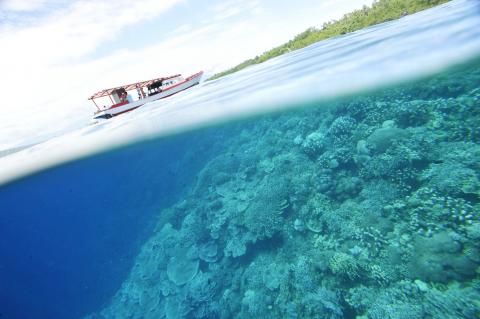More than 2,600 of the world’s top marine scientists yesterday warned coral reefs around the world were in rapid decline and urged immediate global action on climate change to save what remains.
The consensus statement at the International Coral Reef Symposium, being held in the northeastern Australian city of Cairns, stressed that the livelihoods of millions of people were at risk.
Coral reefs provide food and work for countless coastal inhabitants globally, generate significant revenues through tourism and function as a natural breakwater for waves and storms, they said.

Photo: AFP
The statement, endorsed by the forum attendees and other marine scientists, called for measures to head off escalating damage caused by rising sea temperatures, ocean acidification, overfishing and -pollution from the land.
“There is a window of opportunity for the world to act on climate change, but it is closing rapidly,” said Terry Hughes, convener of the symposium, held every four years, which attracted about 2,000 scientists from 80 countries.
Jeremy Jackson, senior scientist at the Smithsonian Institution in the US, said reefs around the world have seen severe declines in coral cover over the past several decades.
In the Caribbean, for example, between 75 and 85 percent of the coral cover has been lost in the past 35 years.
Even the Great Barrier Reef in Australia, the best-protected reef ecosystem on the planet, has witnessed a 50 percent decline in the last 50 years.
Jackson said that while climate change was exacerbating the problem, it was also causing increased droughts, agricultural failure and sea level rises at increasingly faster rates, which implied huge problems for society.
“That means what’s good for reefs is also critically important for people and we should wake up to that fact,” he said. “The future of coral reefs isn’t a marine version of tree-hugging, but a central problem for humanity.”
Stephen Palumbi, director of Stanford University’s Hopkins Marine Station, said addressing local threats, such as poor land -development and unsustainable fishing practices, was also critical.
More than 85 percent of reefs in Asia’s “Coral Triangle” are directly threatened by human activities such as coastal development, pollution and overfishing, according to a report launched at the forum earlier yesterday.
The Coral Triangle covers Indonesia, Malaysia, Papua New Guinea, Philippines, the Solomon Islands and East Timor and contains nearly 30 percent of the world’s reefs and more than 3,000 species of fish.
International Society for Reef Studies president Robert Richmond said that the consensus statement was not just another effort at documenting the mounting problems.
Instead, he said it was also about making the best available science available to leaders worldwide.
“The scientific community has an enormous amount of research showing we have a problem, but right now, we are like doctors diagnosing a patient’s disease, but not prescribing any effective cures,” he said. “We have to start more actively engaging the process and supporting public officials with real-world prescriptions for success.”

Kehinde Sanni spends his days smoothing out dents and repainting scratched bumpers in a modest autobody shop in Lagos. He has never left Nigeria, yet he speaks glowingly of Burkina Faso military leader Ibrahim Traore. “Nigeria needs someone like Ibrahim Traore of Burkina Faso. He is doing well for his country,” Sanni said. His admiration is shaped by a steady stream of viral videos, memes and social media posts — many misleading or outright false — portraying Traore as a fearless reformer who defied Western powers and reclaimed his country’s dignity. The Burkinabe strongman swept into power following a coup in September 2022

‘FRAGMENTING’: British politics have for a long time been dominated by the Labor Party and the Tories, but polls suggest that Reform now poses a significant challenge Hard-right upstarts Reform UK snatched a parliamentary seat from British Prime Minister Keir Starmer’s Labor Party yesterday in local elections that dealt a blow to the UK’s two establishment parties. Reform, led by anti-immigrant firebrand Nigel Farage, won the by-election in Runcorn and Helsby in northwest England by just six votes, as it picked up gains in other localities, including one mayoralty. The group’s strong showing continues momentum it built up at last year’s general election and appears to confirm a trend that the UK is entering an era of multi-party politics. “For the movement, for the party it’s a very, very big

ENTERTAINMENT: Rio officials have a history of organizing massive concerts on Copacabana Beach, with Madonna’s show drawing about 1.6 million fans last year Lady Gaga on Saturday night gave a free concert in front of 2 million fans who poured onto Copacabana Beach in Rio de Janeiro for the biggest show of her career. “Tonight, we’re making history... Thank you for making history with me,” Lady Gaga told a screaming crowd. The Mother Monster, as she is known, started the show at about 10:10pm local time with her 2011 song Bloody Mary. Cries of joy rose from the tightly packed fans who sang and danced shoulder-to-shoulder on the vast stretch of sand. Concert organizers said 2.1 million people attended the show. Lady Gaga

SUPPORT: The Australian prime minister promised to back Kyiv against Russia’s invasion, saying: ‘That’s my government’s position. It was yesterday. It still is’ Left-leaning Australian Prime Minister Anthony Albanese yesterday basked in his landslide election win, promising a “disciplined, orderly” government to confront cost-of-living pain and tariff turmoil. People clapped as the 62-year-old and his fiancee, Jodie Haydon, who visited his old inner Sydney haunt, Cafe Italia, surrounded by a crowd of jostling photographers and journalists. Albanese’s Labor Party is on course to win at least 83 seats in the 150-member parliament, partial results showed. Opposition leader Peter Dutton’s conservative Liberal-National coalition had just 38 seats, and other parties 12. Another 17 seats were still in doubt. “We will be a disciplined, orderly